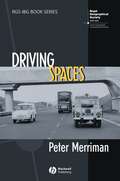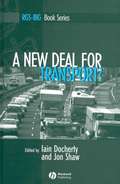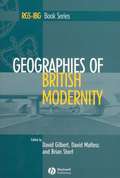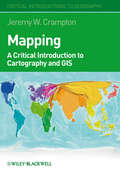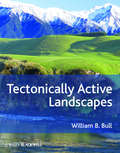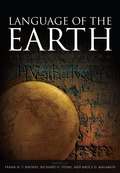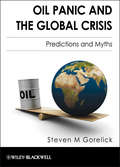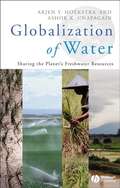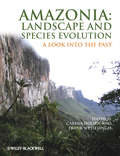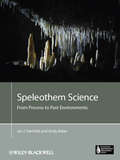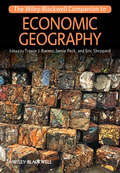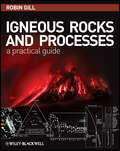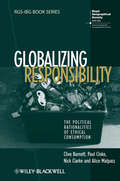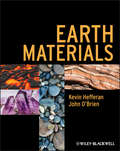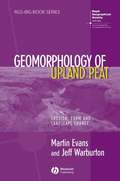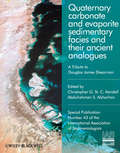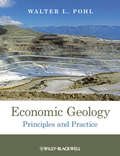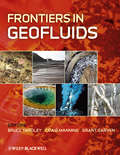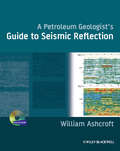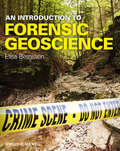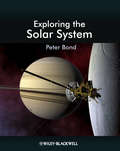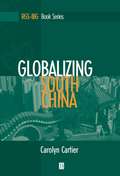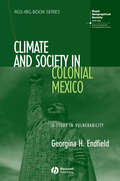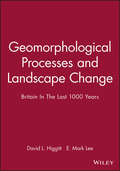- Table View
- List View
Driving Spaces: A Cultural-Historical Geography of England's M1 Motorway (RGS-IBG Book Series #85)
by Peter MerrimanPeter Merriman traces the social and cultural histories and geographies of driving spaces through an examination of the design, construction and use of England’s M1 motorway in the 1950s and 1960s. A first-of-its-kind academic study examining the production and consumption of the landscapes and spaces of a British motorway An interdisciplinary approach, engaging with theoretical and empirical work from sociology, history, cultural studies, anthropology and geography Contains 38 high quality illustrations Based on extensive, original archive work
A New Deal for Transport?: The UK's struggle with the sustainable transport agenda (RGS-IBG Book Series #75)
by Jon Shaw Iain DochertyComprising contributions from a range of experts, this volume offers a critical commentary on the government's sustainable transport policy. A critical commentary on the Blair government's sustainable transport policy and its implementation. Firmly rooted in an appreciation of the politics of this controversial field. Experts contribute up-to-the-minute analyses of the key issues. Will inform debate over the future of transport policy. Includes a Foreword by David Begg, Chair of the Commission for Integrated Transport.
Geographies of British Modernity: Space and Society in the Twentieth Century (RGS-IBG Book Series #81)
by David Gilbert Brian Short David MatlessThis volume brings together leading scholars in the geography and history of twentieth-century Britain to illustrate the contribution that geographical thinking can make to understanding modern Britain. The first collection to explore the contribution that geographical thinking can make to our understanding of modern Britain. Contains thirteen essays by leading scholars in the geography and history of twentieth-century Britain. Focuses on how and why geographies of Britain have formed and changed over the past century. Combines economic, political, social and cultural geographies. Demonstrates the vitality of work in this field and its relevance to everyday life.
Lost Geographies of Power (RGS-IBG Book Series #79)
by John AllenThis original study explores the difference that space and spatiality make to the understanding of power. Explores the difference that space and spatiality makes to an understanding of power. Moves forward the incorporation of ideas of space into social theory. Presents a new understanding of the exercise, uses and manifestations of cultural, economic and political power in the second half of the twentieth century. Illustrated with cases and examples.
Mapping: A Critical Introduction to Cartography and GIS (Critical Introductions to Geography #11)
by Jeremy W. CramptonMapping: A Critical Introduction to Cartography and GIS is an introduction to the critical issues surrounding mapping and Geographic Information Systems (GIS) across a wide range of disciplines for the non-specialist reader. Examines the key influences Geographic Information Systems (GIS) and cartography have on the study of geography and other related disciplines Represents the first in-depth summary of the “new cartography” that has appeared since the early 1990s Provides an explanation of what this new critical cartography is, why it is important, and how it is relevant to a broad, interdisciplinary set of readers Presents theoretical discussion supplemented with real-world case studies Brings together both a technical understanding of GIS and mapping as well as sensitivity to the importance of theory
Tectonically Active Landscapes
by William B. BullThis book explores how mountainous landscapes respond to tectonic deformation. It integrates previously unpublished concepts and ideas with recent articles about hills and streams. Readers will learn which landforms change quickly in response to uplift, which parts of the landscape are slowest to adjust to tectonic perturbations, and which landform characteristics are most useful for describing tectonically active and inactive terrains. Study areas include diverse landscapes and tectonic settings: seacoasts, soil-mantled hills, and lofty mountains. The humid Southern Alps of New Zealand change quickly because of rapid uplift and erosion. The semiarid Panamint Range of southeastern California has such miniscule annual stream power that tectonic landforms persist for millions of years.Tectonically Active Landscapes addresses diverse key topics about tectonics and topography. It is essential reading for research geologists and advance-level undergraduate and graduate students in the earth sciences.
Language of the Earth: A Literary Anthology
by Bruce D. Malamud Richard O. Stone Frank H.t. RhodesMan's complex relationship to planet Earth is explored in this second edition of the landmark anthology edited by Frank Rhodes and Bruce Malamud. This volume provides a portrait of the planet as experienced not just by scientists, but by artists, aviators, poets, philosophers, novelists, historians, and sociologists as well. A unique collection that bridges the gap between science and humanities Contains writings by scientists, artists, aviators, poets, philosophers, novelists, historians, and sociologists including Charles Darwin, Dane Picard, Rachel Carson, John Muir, Mark Twain and Archibald Geikie Represents the human experience over the centuries, covering a span of 2,500 years Reflects the planet's extraordinary physical diversity The previous edition was voted one of the 25 'Great Books of Geology' by readers of the Journal of Geological Education "...this is a very worthwhile read, with something for everyone interested in geography, earth systems and geology, natural history or the general environment." Robert A. Francis, King's College London, Progress in Physical Geography
Oil Panic and the Global Crisis
by Steven M. GorelickIs the world running out of oil? This book analyzes predictions of global oil depletion in the context of science, history, and economics.There has been continuing alarm about the imminent exhaustion of earth's non-renewable resources. Yet, the world has never run out of any significant, globally traded, non-renewable resource. Is the world finally facing a non-renewable resource depletion catastrophe, or is the current concern just another one of a succession of panics? In this book, key assumptions and underlying arguments in the global oil-depletion debate are first summarized and then challenged. Facts about oil supply, production, and consumption are made accessible using concise and simple graphics.Concepts of resource depletion, end-use needs, technology leap-frogging, efficiency, and substitution are used to evaluate historical patterns of exploitation of non-renewable resources and to explore what history suggests about our future dependence on oil.This book is aimed at a broad range of readers,from undergraduate students studying resource science and economics to anyone interested in understanding the context of the controversy over global oil depletion."It is a book serious students of the world oil market should read, not because Gorelick has all the answers but because his account is well reasoned, well informed, and argued honestly, with respect for responsible opposing viewpoints."Book Review, Science, May 2010
Globalization of Water: Sharing the Planet's Freshwater Resources
by Ashok K. Chapagain Arjen Y. HoekstraGlobalization of Water is a first-of-its-kind review of the critical relationship between globalization and sustainable water management. It explores the impact of international trade on local water depletion and pollution and identifies “water dependent” nations. Examines the critical link between water management and international trade, considering how local water depletion and pollution are often closely tied to the structure of the global economy Offers a consumer-based indicator of each nation’s water use: the water footprint Questions whether trade can enhance global water use efficiency, or whether it simply shifts the environmental burden to a distant location Highlights the hidden link between national consumption and the use of water resources across the globe, identifying the threats facing ‘water dependent’ countries worldwide Provides a state-of-the-art review and in-depth data source for a new field of knowledge
Amazonia, Landscape and Species Evolution
by Frank Wesselingh Carina HoornThe book focuses on geological history as the critical factor in determining the present biodiversity and landscapes of Amazonia. The different driving mechanisms for landscape evolution are explored by reviewing the history of the Amazonian Craton, the associated sedimentary basins, and the role of mountain uplift and climate change.This book provdes an insight into the Meso- and Cenozoic record of Amazonia that was characterized by fluvial and long-lived lake systems and a highly diverse flora and fauna. This fauna includes giants such as the ca. 12 m long caiman Purussaurus, but also a varied fish fauna and fragile molluscs, whilst fossil pollen and spores form relics of ancestral swamps and rainforests.Finally, a review the molecular datasets of the modern Amazonian rainforest and aquatic ecosystem, discussing the possible relations between the origin of Amazonian species diversity and the palaeogeographic, palaeoclimatic and palaeoenvironmental evolution of northern South America. The multidisciplinary approach in evaluating the history of Amazonia has resulted in a comprehensive volume that provides novel insights into the evolution of this region.
Speleothem Science
by Andy Baker Ian J. FairchildSpeleothems (mineral deposits that formed in caves) are currently giving us some of the most exciting insights into environments and climates during the Pleistocene ice ages and the subsequent Holocene rise of civilizations. The book applies system science to Quaternary environments in a new and rigorous way and gives holistic explanations the relations between the properties of speleothems and the climatic and cave setting in which they are found. It is designed as the ideal companion to someone embarking on speleothem research and, since the underlying science is very broad, it will also be invaluable to a wide variety of others. Students and professional scientists interested in carbonate rocks, karst hydrogeology, climatology, aqueous geochemistry, carbonate geochemistry and the calibration of climatic proxies will find up-to-date reviews of these topics here. The book will also be valuable to Quaternary scientists who, up to now, have lacked a thorough overview of these important archives.Additional resources for this book can be found at: www.wiley.com/go/fairchild/speleothem.
The Wiley-Blackwell Companion to Economic Geography (Wiley Blackwell Companions to Geography #21)
by Trevor J. Barnes Eric Sheppard Jamie PeckThe Wiley-Blackwell Companion to Economic Geography presents students and researchers with a comprehensive overview of the field, put together by a prestigious editorial team, with contributions from an international cast of prominent scholars. Offers a fully revised, expanded, and up-to-date overview, following the successful and highly regarded Companion to Economic Geography published by Blackwell a decade earlier, providing a comprehensive assessment of the field Takes a prospective as well as retrospective look at the field, reviewing recent developments, recurrent challenges, and emerging agendas Incorporates diverse perspectives (in terms of specialty, demography and geography) of up and coming scholars, going beyond a focus on Anglo-American research Encourages authors and researchers to engage with and contextualize their situated perspectives Explores areas of overlap, dialogues, and (potential) engagement between economic geography and cognate disciplines
Igneous Rocks and Processes
by Robin GillThis book is for geoscience students taking introductory or intermediate-level courses in igneous petrology, to help develop key skills (and confidence) in identifying igneous minerals, interpreting and allocating appropriate names to unknown rocks presented to them. The book thus serves, uniquely, both as a conventional course text and as a practical laboratory manual.Following an introduction reviewing igneous nomenclature, each chapter addresses a specific compositional category of magmatic rocks, covering definition, mineralogy, eruption/ emplacement processes, textures and crystallization processes, geotectonic distribution, geochemistry, and aspects of magma genesis. One chapter is devoted to phase equilibrium experiments and magma evolution; another introduces pyroclastic volcanology. Each chapter concludes with exercises, with the answers being provided at the end of the book.Appendices provide a summary of techniques and optical data for microscope mineral identification, an introduction to petrographic calculations, a glossary of petrological terms, and a list of symbols and units. The book is richly illustrated with line drawings, monochrome pictures and colour plates.Additional resources for this book can be found at: http://www.wiley.com/go/gill/igneous.
Globalizing Responsibility: The Political Rationalities of Ethical Consumption (Rgs-ibg Book Ser. #65)
by Paul Cloke Clive Barnett Alice Malpass Nick ClarkeGlobalizing Responsibility: The Political Rationalities of Ethical Consumption presents an innovative reinterpretation of the forces that have shaped the remarkable growth of ethical consumption. Develops a theoretically informed new approach to shape our understanding of the pragmatic nature of ethical action in consumption processes Provides empirical research on everyday consumers, social networks, and campaigns Fills a gap in research on the topic with its distinctive focus on fair trade consumption Locates ethical consumption within a range of social theoretical debates -on neoliberalism, governmentality, and globalisation Challenges the moralism of much of the analysis of ethical consumption, which sees it as a retreat from proper citizenly politics and an expression of individualised consumerism
Earth Materials
by John O'Brien Kevin HefferanMinerals and rocks form the foundation of geologic studies. This new textbook has been written to address the needs of students at the increasing number of universities that have compressed separate mineralogy and petrology courses into a one- or two-semester Earth materials course.Key features of this book include:equal coverage of mineralogy, sedimentary petrology, igneous petrology and metamorphic petrology;copious field examples and regional relationships with graphics that illustrate the concepts discussed;numerous case studies to show the uses of earth materials as resources and their fundamental role in our lives and the global economy, and their relation to natural and human-induced hazards;the integration of earth materials into a cohesive process-based earth systems framework;two color thoughout with 48 pages of four color. Readership: students taking an earth materials, or combined mineralogy and petrology course in an earth science degree program. It will also be useful for environmental scientists, engineering geologists, and physical geographers who need to learn about minerals, rocks, soil and water in a comprehensive framework. A companion website for this book is available at: www.wiley.com/go/hefferan/earthmaterials.
Geomorphology of Upland Peat: Erosion, Form and Landscape Change (RGS-IBG Book Series #70)
by Jeff Warburton Martin EvansThe Geomorphology of Upland Peat offers a detailed synthesis of existing literature on peat erosion, incorporating new research ideas and data from two leading experts in the field. Presents the most detailed and current work to date Written in a style that is both intelligent and accessible Fully illustrated with original drawings and photographs Relevant and information for a broad audience working on organic sediments in various environments
Quaternary Carbonate and Evaporite Sedimentary Facies and Their Ancient Analogues: A Tribute to Douglas James Shearman (International Association Of Sedimentologists Ser. #106)
by Tom Stevens Christopher G. St.C. Kendall Abdulrahman S. Alsharhan Ian JarvisThis book is part of the International Association of Sedimentologists (IAS) Special Publications. The Special Publications from the IAS are a set of thematic volumes edited by specialists on subjects of central interest to sedimentologists. Papers are reviewed and printed to the same high standards as those published in the journal Sedimentology and several of these volumes have become standard works of reference. This volume commemorates the eclectic research of Douglas James Shearman into evaporites, which was initiated by his studies of the prograding UAE coastal sabkhas or salt flats that incorporate evaporite minerals which displace and replace earlier carbonate sediments. His subsequent proselytization of the study of ancient evaporites in sedimentary sections all over the world led to fundamental advances in our understanding of arid zone carbonate sedimentology. The papers presented here are based on presentations made in Abu Dhabi, UAE 12-14th October 2004 and 7th –8th November 2006. They provide a retrospective from the 1960's and 70's of Holocene evaporites and carbonates, recapturing Shearman's contribution by revisiting the Holocene coastal evaporite and carbonate sediments of the Arabian/Persian Gulf from Abu Dhabi, Qatar, and Oman. The first set of papers considers these sediments from the perspective of their coastal geomorphology, sedimentary character and their geochemistry. Later papers examine the significance of these settings in the ancient geological section world-wide, including examples from the Mesozoic-Cenozoic of the Moroccan Atlantic margin and the Upper Jurassic Arab Formation of the Arabian Gulf.
Economic Geology
by Walter L. PohlHumanity's ever-increasing hunger for mineral raw materials, caused by a growing global population and ever increasing standards of living, has resulted in economic geology becoming a subject of urgent importance.This book provides a broad panorama of mineral deposits, covering their origin and geological characteristics, the principles of the search for ores and minerals, and the investigation of newly found deposits. Practical and environmental issues that arise during the life cycle of a mine and after its closure are addressed, with an emphasis on sustainable and "green" mining.The central scientific theme of the book is to place the extraordinary variability of mineral deposits in the frame of fundamental geological processes.The book is written for earth science students and practicing geologists worldwide. Professionals in administration, resource development, mining, mine reclamation, metallurgy, and mineral economics will also find the text valuable.Economic Geology is a fully revised translation of the the fifth edition of the German language text Mineralische und Energie-Rohstoffe.Additional resources for this book can be found at: www.wiley.com/go/pohl/geology.The author's website can be found at: http://www.walter-pohl.com.
Frontiers in Geofluids
by Bruce Yardley Craig Manning Grant GarvenFrontiers in Geofluids is a collection of invited papers chosen to highlight recent developments in our understanding of geological fluids in different parts of the Earth, and published to mark the first ten years of publication of the journal Geofluids. The scope of the volume ranges from the fundamental properties of fluids and the phase relationships of fluids encountered in nature, to case studies of the role of fluids in natural processes. New developments in analytical and theoretical approaches to understanding fluid compositions, fluid properties, and geological fluid dynamics across a wide range of environments are included. A recurrent theme of research published in Geofluids is the way in which similar approaches can be applied to geological fluids in very different settings and this is reflected in the diverse range of applications of fluid studies that are included here. They include deep groundwater flow, hydrocarbons in faulted sedimentary basins, hydrothermal ores, and multiphase flow in mid-ocean ridge systems. Other topics covered are geothermal waters, crustal metamorphism, and fluids in magmatic systems. The book will be of great interest to researchers and students interested in crustal and mantle fluids of all sorts.
A Petroleum Geologist's Guide to Seismic Reflection
by William AshcroftThis book is written for advanced earth science students, geologists, petroleum engineers and others who want to get quickly 'up to speed' on the interpretation of reflection seismic data. It is a development of material given to students on the MSc course in Petroleum Geology at Aberdeen University and takes the form of a course manual rather than a systematic textbook. It can be used as a self-contained course for individual study, or as the basis for a class programme.The book clarifies those aspects of the subject that students tend to find difficult, and provides insights through practical tutorials which aim to reinforce and deepen understanding of key topics and provide the reader with a measure of feedback on progress. Some tutorials may only involve drawing simple diagrams, but many are computer-aided (PC based) with graphics output to give insight into key steps in seismic data processing or into the seismic response of some common geological scenarios. Part I of the book covers basic ideas and it ends with two tutorials in 2-D structural interpretation. Part II concentrates on the current seismic reflection contribution to reservoir studies, based on 3-D data.
An Introduction to Forensic Geoscience
by Elisa BergslienAn Introduction to Forensic Geoscience provides fundamental training in geoscience as developed through the lens of its forensic applications. It incorporates a range of topics including geophysical methods of grave detection, the mineralogy of art, identification of microfossils, and comparison of soil trace evidence samples. Each topic is introduced using core concepts that are developed with increasing complexity in order to give readers an understanding of the underlying scientific principles involved and a taste of the wide range of possible forensic uses. A variety of detailed reference tables have been compiled for the text and each chapter contains lists of references to applicable textbooks and journal articles. Examples of real criminal cases are also presented in each chapter to make the connections between theory and real world application. The goal of this book is to give readers a familiarity with the wide range of ways in which geoscience principles and geological materials can be utilized forensically. Additional resources for this book can be found at: http://www.wiley.com/go/bergslien/forensicgeoscience.
Exploring the Solar System (Coursesmart Ser.)
by Peter BondThe exploration of our solar system is one of humanity's greatest scientific achievements. The last fifty years in particular have seen huge steps forward in our understanding of the planets, the sun, and other objects in the solar system. Whilst planetary science is now a mature discipline - involving geoscientists, astronomers, physicists, and others – many profound mysteries remain, and there is indeed still the tantalizing possibility that we may find evidence of life on another planet in our system.Drawing upon the latest results from the second golden age of Solar System exploration, author Peter Bond provides an authoritative and up-to-date account of the planets, satellites and smaller debris that orbit the Sun. Written in an informal style, with minimal use of mathematics, this book is the ideal introductory text for non-science students and other readers with little or no science background. With the aid of numerous illustrations, many in full colour, this exciting book brings to life the weird and wonderful worlds that populate our corner of the Universe. This book: Assumes no background in physics , astronomy or mathematics Carefully explains key concepts Gives balanced coverage to areas of controversy or uncertainty in planetary science Is in in full color throughout and richly illustrated An interview with Peter can be found at http://wisciblog.com/2012/02/28/exploring-the-solar-system/
Globalizing South China (RGS-IBG Book Series #91)
by Carolyn CartierThis insightful account demonstrates that capitalism in China has a history and a geography, and combines perspectives from both to demonstrate that regional economic restructuring in South China is far from an economic 'miracle's. Find out more information about the RGS-IBG journals by following the links below: AREA: http://www.blackwellpublishing.com/journal.asp?ref=0004-0894 The Geographical Journal: http://www.blackwellpublishing.com/journal.asp?ref=0016-7398 Transactions of the Insititute of British Geographers: http://www.blackwellpublishing.com/journal.asp?ref=0020-2754
Climate and Society in Colonial Mexico: A Study in Vulnerability (RGS-IBG Book Series)
by Georgina H. EndfieldBy considering three case study regions in Mexico during the Colonial era, Climate and Society in Colonial Mexico: A Study in Vulnerability examines the complex interrelationship between climate and society and its contemporary implications. Provides unique insights on climate and society by capitalizing on Mexico’s rich colonial archives Offers a unique approach by combining geographical and historic perspectives in order to comprehend contemporary concerns over climate change Considers three case study regions in Mexico with very different cultural, economic, and environmental characteristics
Geomorphological Processes and Landscape Change: Britain In The Last 1000 Years (RGS-IBG Book Series #69)
by David L. Higgitt E. Mark LeeThe expert contributors to this cutting edge volume provide an overview of geomorphological process activity and landscape change in Britain over the past 1000 years. The range of the book is unusually broad, encompassing hillslope, valley floor and floodplain, fluvial, estuarine and coastal processes. Provides an overview of geomorphological process activity and landscape change in Britain over the past 1000 years. The range of the book is unusually broad, encompassing hillslope, valley floor and floodplain, fluvial, estuarine and coastal processes. Considers the relevance of technological and conceptual approaches to understanding landscape dynamics. Examines key process environments highlighting significant trends and the influence of human activity, and incorporating examples and modelling. Encourages geographers to look forward to the challenges that geomorphology faces in the new millennium. Find out more information about the RGS-IBG journals by following the links below: AREA: http://www.blackwellpublishing.com/journal.asp?ref=0004-0894 The Geographical Journal: http://www.blackwellpublishing.com/journal.asp?ref=0016-7398 Transactions of the Insititute of British Geographers: http://www.blackwellpublishing.com/journal.asp?ref=0020-2754
